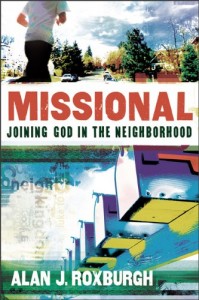 Alan J. Roxburgh. Missional: Joining God in the Neighborhood. Baker Books, 2011. ISBN: 780801072314.
Alan J. Roxburgh. Missional: Joining God in the Neighborhood. Baker Books, 2011. ISBN: 780801072314.
Meet the Author
Alan J. Roxburgh is the President of the Missional Network (formerly Roxburgh Missional Network), which is “committed to resourcing missional leaders with the best training, consulting and hands-on resources for innovating missional life in local congregations and communities of faith.” Previously he served in pastoral ministry for over twenty-five years. Roxburgh is a prolific writer. His recent books include Missional Map-Making: Skills for Leading in Times of Transition (2010) and Introducing the Missional Church: What it is, Why it Matters, How to Become One (2009), which he co-authored with Scott Boren.
Book Basics
As churches seek to find ways to effectively adjust to an increasingly postmodern and pluralistic world their leaders can find an almost innumerable listing of ideas in recently published literature. Those texts seek to change the church, but, in Roxburgh’s view, will ultimately fail because they are church-centric rather than affording equal attention to church, culture and Scripture. He counters with an alternative way forward that builds heavily upon the work of renowned missiologist Lesslie Newbigin and the biblical text of Luke-Acts while intentionally avoiding a church-centric model. To more fully experience what it means to be a local church, Roxburgh proposes:
- Recognizing the church’s current identity crisis is largely a result of being heavily shaped by and continually dependent upon a “Eurocentric Reformation” outlook, which has become irrelevant in the early twenty-first century
- Shifting the church’s “language house” from its current Platonic perspective to an Aristotelian vantage aligned with Luke’s understanding
- “Retheologizing” for our time much as Luke did for the Gentiles in his time to move away from the narrative of loss by connecting with what God is doing in the world
- “Practicing eschatology” by learning to leave our baggage behind and enter the neighborhoods where we live to genuinely receive hospitality and engage the other without an underlying motive of getting these people to become a part of our church family
So What?
The church must change to have meaning in a postmodern world. The fastest growing religious designation is non-affiliation – a group also known as “nones.” Most denominations have been struggling with this concern for years, but have yet to make major changes. Roxburgh suggests ten rules that when followed can help enact change on a local level:
- Go local

- Leave your baggage at home
- Don’t move from house to house
- Eat what is set before you
- Become poets of the ordinary
- Move the static into the unpredictable
- Listen people into speech
- Experiment around the edges
- Cultivate experiments not BEHAGS (Big Hairy Audacious Goals)
- Repeat rules one through nine over and over again (p.166-178).
Roxburgh’s proposed methodology is not complete, but is an important contribution to the ongoing conversation. In my view, his limited appreciation of virtual presence has contributed to a model that is heavily dependent on face-to-face interaction, which is no longer deemed a primary means of interaction by a growing number of people. Rather than suggesting the way forward is only face-to-face or only virtual, I suggest that the way forward is enriched when it encounters people in all of the ways they interact.
How is your local congregation seeking to change in ways that move beyond adding or subtracting programs, worship services and/or staff and that are faithful to Scripture and embedded in culture? How does your local congregation train people to practice eschatology through intentional interaction with their geographic neighbors?